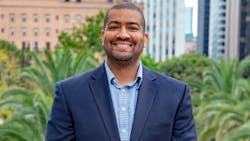2021 40 Under 40: Lance MacNiven, PMP, ENV SP
- One word to describe yourself: Determined
- Alma Mater: Loyola Marymount University and University of California Los Angeles
- Fun fact: I'm one of the few (former) sailors that can say they were on a naval warship when it ran aground.
- Favorite station or stop: Pioneer Square Station in Seattle. I've heard that they don't run buses down the tunnels anymore, but I used to love hopping off the Link and seeing buses share the tunnels.
- Favorite route: Amtrak Pacific Surfliner
Lance MacNiven is a transportation planner with a background in transportation and environmental planning. He currently serves as a project manager and WSP’s national lead for zero-emission vehicle and fleet planning. MacNiven has emerged as a proven leader and subject-matter expert in the planning for zero-emission vehicle (ZEV) and fleet transitions.
He has led planning efforts, such as service modeling, utility coordination, stakeholder engagement, technical management and technical writing, for more than 15 zero-emission bus projects. This equates to more than 45 facilities and 4,000 vehicles.
In addition, MacNiven has contributed to several innovations in zero-emission transit bus fleet transition planning. For example, he co-led the development of a battery-electric bus (BEB) modeling tool that determines the viability and performance of BEBs based on an agency’s provided schedule. The new tool also allows agencies to do quick scenario planning, such as comparing battery sizes or performance with fuel cell buses.
He also streamlined the development of the California Air Resource Board’s (CARB) Rollout Plans, which are required by California’s Innovative Clean Transit (ICT) regulation stating all transit agencies must transition to ZEBs by 2040. His approach has been used on four CARB-approved rollout plans, saving transit agencies thousands of dollars.
MacNiven also serves as the Chair of the American Planning Association’s Transportation Planning Division (2021-2023) and is an active member of COMTO, WTS, YPT, California Transit Association (CTA) and APTA. He has also presented his ZEB-related work and experiences in collaboration with several entities and conferences, including CTA, APTA, Washington State Transit Association and more.
Finally, MacNiven has earned several project-related industry certifications, including a Project Management Professional certification, ENV certification and an Energy Innovation and Emerging Technologies Certificate issued by Stanford University.
Is there a specific experience that led you to where you are today?
Public transit has always been integral in how I've moved around cities. Growing up in Long Beach, CA, the Metro Blue Line and Long Beach Transit were my means for transportation to school, work, malls, and of course, In N Out. I didn't receive my license until I was 21 - up until then, I was the only sailor on my ship that would take Honolulu's TheBus to Waikiki for late night partying! This long-term dependence on public transit formed my passion and love for it.
What’s the most challenging part of your job?
Working in a market and industry that is inherently fluid. Almost all plans/documents/projects must be authored or designed in a way that allows for tweaks and changes that may have much larger impacts on the backend. This means that project scopes and expectations have to be extremely clear because when you're chasing a moving target (ZEV technology, market trends, COVID ridership changes/impacts, etc.), it does pose a risk to projects. This is something our team has learned to balance, although it still is one of the most difficult components of transition projects.
Accomplishment you’re most proud of and why?
While there are several projects and experiences that I can point to, my greatest accomplishments are my two kids, Hudson and Piper - both of which already have their TAP cards for Metro's system.
Best advice/tip/best practice to share from your area of expertise?
Reliability is king. I love working with smart and informed people - and I have a LOT of smart and informed people on my team; but, being reliable is almost just as important (in my book). If you say you're going to do something, do it. If you set a deadline, meet it. In the military, you learn to trust and depend on the people you work with, people of all backgrounds, skill levels, etc. At the end of the day, it's the trust that binds you together. Being reliable builds a trust that makes you an invaluable asset to a team.
